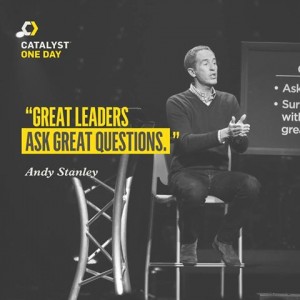Recently I was able to spend the day at Catalyst One Day, an event hosted by Andy Stanley and Craig Groeschel. This one day event is a series of back to back talks that share the leadership values that they hold to.
It was amazing!
Below are five questions that I have asked myself based upon the leadership values Andy and Craig shared are important to determine what I value the most.
(Also, if you’d like a discussion guide that I created based on these questions that can be used in group or team settings enter your email below. — and, don’t worry… it’s free!)
1. Do I Value Questions?
Questions can be intimidating.
If you are insecure as a leader you will confuse being asked a question with being questioned.
However, when leadership places value on questions it can lead to problems being solved and finding the right answers.
Great Questions Will…
- Reveal what you think is important.
- Remind you of what is important.
- Reinforce behaviors that support what is important.
An Example: If a value that your team holds to is “To Make It Better.” a great question to ask that will reinforce the value and move your team toward displaying this value is,
“What Am I Doing To Help Improve Things?”
By asking a question rather than making a statement the team member becomes personally responsible to uphold the value as a leader.
Craft questions that will illuminate leadership values.
Live By The Question, “What Would A Great Leader Do?” Asking this questions pushes aside what may be easiest or preferred and brings to the surface what could be or should be done.
2. Are Good Leaders Good At Everything?
Good leaders are not good at everything, and don’t have to be. For me, this is so freeing!
In 2003 I received my first paid position at a church as a youth pastor. I had no idea what I was doing, (still don’t). The difference from today and back then is I have an easier time admitting that I don’t know everything.
One area I always struggled in was preparing for summer camp. The logistics, the games, planning the day, ect. It just was not my thing. My wife however LOVES youth summer camps, even to this day. She could have done an amazing job leading camp in those areas. I could have (and should have) done what I was best at – while releasing her to do what she was best at…
The problem was I was too insecure. I thought I had to be good at everything. That thought did not help me, the youth group, or the church.
The point is, be secure enough to release others to do what they are better at doing than you.
3. Do I Allow Others To Lead?
This questions falls right in line with the last one but takes it a step further. Leadership is not as much about position as it is influence. Good leaders create environments for those around them to influence in both directions, horizontally and vertically.
Honest communication should be able to flow upward. If not, the point person will lose touch with reality and those who have valuable input to share will eventually find someplace else that will listen to what they have to say.
Below are some of my favorite quotes from Craig Groeschel about the practice of “Leading-Up”:
“The biggest myth about leadership: You have to be in charge in order to lead.”
“There is a massive difference between thinking critically and being critical.”
“If you are waiting to be handed something significant, you lower the chances of being handed anything at all.”
“If you are the point leader, you need to do everything you can to give opportunities for others to lead up.”
4. Do Peripheral Matters Pull Me Away From What Is Most Critical To The Mission?
In order to structure your life, family, church, team, events, meetings, schedule, for what is most important you have to know what is.

Once you are aware, or reminded, of what the reason for your team, ministry, etc. is begin to identify the things that pull you away from doing what is most important.
There are details that will pull us away from what is most important to the mission (just think of spiritual disciplines – which are the most mission-critical practices to everything btw).
If we are not careful our teams, ministry, and life will be structured around the peripheral instead of what is mission-critical.
Often times it’s the little things like pressure and expectation from other people that we allow to pull us away from what we know is most important.
Sometimes it is a result of not realizing how important it is to keep the mission/vision central. It doesn’t take long for the goal to become unclear or forgotten amidst the demands, new ideas, and potential opportunities.
If you are a ministry leader or pastor take a moment and ask yourself, “Do the things that seemingly support the mission or the mission itself get the most air time?”
Without a clear understanding of how the “things” (whatever they be) support and further the mission/vision, they will probably hinder it.
Keep what is mission-critical front and center and be ok with what is not being peripheral.
5. Am I Striving For Independence More Than Accountability?
You have probably heard the saying, “Your talent can take you places but it’s your character that will keep you there.”
A person of godly character will be intentional about establishing accountability with other people. Unfortunately, we are all too familiar with great leaders who have fallen, more than likely because they made decisions that crept them closer and closer toward isolation and inaccessibility.
Andy Stanley is such a great communicator and is able to get the point across in short, concise statements. One of my favorite things that he said about our efforts to be autonomous is that,
“Power is intoxicating. Intoxicated people do not make good decisions.”
The more we strive for autonomy the further we remove ourselves from admirable traits such as humility, servant-hood, and honesty and the more prone we become to making bad decisions that we end up regretting.
Andy also asked the question, “Are you willing to give people who don’t need anything from you access to you?”
Without honest accountability with people who are outside of your sphere of authority and power you are setting your own trap.
Who is in your life that you can ask to keep you accountable?
Have you had opportunity to be accountable but rejected it?
What can you do today to establish accountability in your life?




